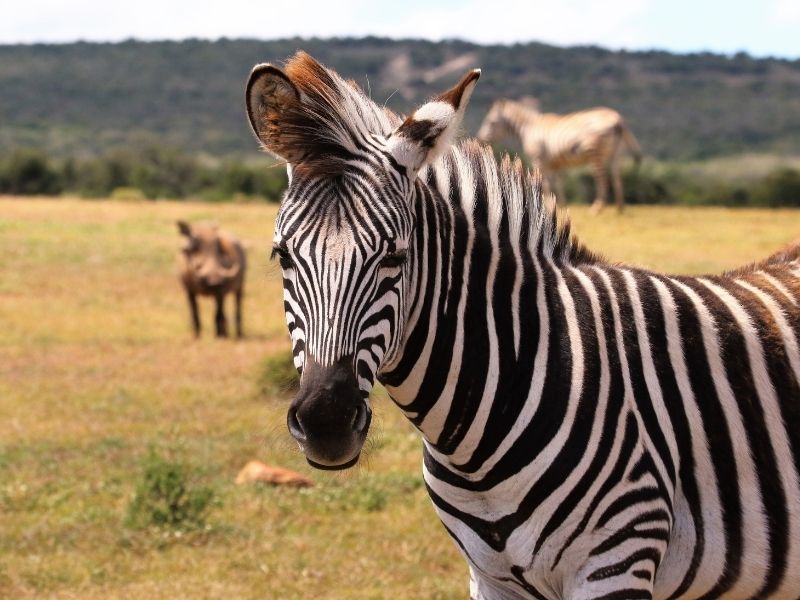Inglés para niños: 10 amazing facts about zebras
10 datos sorprendentes sobre las cebras en inglés para que los niños aprendan de forma divertida
Publicado por Alba Caraballo, editora de Conmishijos.com
Creado: 1 de junio de 2023 16:06 | Modificado: 9 de abril de 2025 08:22
Te invitamos a leer 10 datos asombrosos sobre las cebras en inglés: 10 amazing facts about the zebras. Una lectura muy entretenida para niños de Primaria, de la mano de la revista para aprender inglés I Love English Junior (marzo - abril 2021, número 117).
Los niños conocerán datos muy interesantes y divertidos sobre estos animales que tienen un dibujo en la piel muy original. Además, aprenderán nuevo vocabulario y practicarán la lectura en inglés.
Ver +: Lecturas para niños en inglés
Inglés para niños: 10 amazing facts about the zebras

1. Zebras live in vast areas of eastern and southern Africa. Their preferred habitat are treeless grasslands and savannah woodlands. Unfortunately, their habitat is shrinking and even extinct in Lesotho and Burundi, two of the countries which they're native to.
2. Zebras live in herds or small family groups consisting of a male, called stallion, which leads the group, several females and their young or babies. The group remains so close that if a predator injures one individual, fellow members will circle it and attempt to scare the intruder away.
3. Zebras are related to horses -both belong to the Equidae family-, but they're not the same species. In fact, zebras are closer to donkeys than to horses in terms of conformation. Zebras range in height from about 1.2-1.5 metres, whereas a horse can grow up to 1.8 metres.
4. Because of this height difference between zebras and horses, riding a zebra is not recommended. They can't support the weight of an adult human for a long time without getting injured.
5. You can't have a zebra as a pet either, as they are unpredictable, grumpy or bad-tempered and may attack if they're scared. They may turn aggressive and far more dangerous than horses, and even kick each other to death, bite humans and kill lions.
6. The black and white stripes of zebras are thought to serve different purposes: as camouflage against predators, to scare away animals, and as thermoregulation (the white stripes absorbing the heat and warming zebras up, and the black ones reflecting the light and keeping zebras cool), but the real function of a zebra's stripes remains unsolved.
7. Zebras gather together in huge herds of thousands when they plan to migrate to new and better feeding areas. They are constantly on the move and even travel in mixed herds with other species like grazers, wildebeest or browsers.
8. Mother zebras keep away her baby from other zebras for a few days to make sure that the baby learns her smell, stripe pattern and voice. It is very important that the baby zebra is able to recognize its mother.
9. Did you know that in ancient times zebras were trained to pull chariots at circuses? They were named "hippotigris" (horse-tiger) by the Greeks and Romans. Nowadays domestication or training of zebras is possible but not practical or really acceptable.
10. A group of zebras is called a "dazzle". They are so named for the motion dazzle effect when running. You can also simply say a "herd of zebras" or a "zeal of zebras", but those terms don't sound so fun, do they?
Artículos relacionados
Podcasts de la revista para aprender inglés: I Love English Junior
La revista para que los niños aprendan inglés: I Love English Junior, nos invita a escuchar una serie de podcast que ayudarán a los niños a familiarizarse con la...
Inglés para niños: 10 amazing facts about the world's largest and fastest animals
Te invitamos a leer 10 datos asombrosos sobre los animales más grandes y rápidos del mundo en inglés: 10 amazing facts about the world's largest and fastest...
Lectura en inglés para niños: 10 fun facts about Christmas around the world
¿Quieres saber más sobre cómo se celebra la Navidad alrededor del mundo? Te invitamos a leer 10 fun facts about Christmas around the world elaborado por la...
Textos en inglés: lecturas divertidas y curiosas para aprender
Lecturas en inglés divertidas para niños de Primaria: descubre 10 amazing facts sobre animales, ciudades y más. Aprende inglés con curiosidades reales.
Lecturas en inglés para niños: 10 great New York icons
La revista para aprender inglés I Love English Junior os invita a aprender y practicar el idioma de forma divertida. Si tienes hijos o alumnos que estén en...
Comentarios
¡Sé el primero en comentar!
















